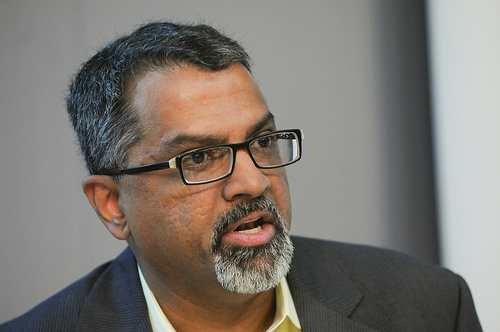
Raju Narisetti from the Wall Street Journal, pictured speaking at the news:rewired conference, earlier this year
Speaking at the World Editors Forum on Monday (3 September), managing editor for the Wall Street Journal’s digital network Raju Narisetti said he had concerns about many US “copycat” paywalls, and whether they would be able to generate the necessary revenues to succeed financially.
Instead, he predicted that “the golden age of digital advertising lies ahead of us” and that by “running towards paywalls” news outlets may be missing the challenges of the future, such as the mobile consumption of news and the need to produce content which can travel with its advertising to platforms outside the news outlet’s own.
I caught up with him after the session to speak to him more about his views on digital business strategy, “copycat” paywalls, and why he thinks smaller news brands shouldn’t be “throwing the advertising baby out with the bathwater”.
I think most US metro papers are looking at the New York Times and saying let’s follow their model, whether it’s 20 free stories or 30 free stories, it’s a metered wall, and I think the New York Times has seemed to have pulled it off but I think a lot of smaller papers will find that the content they have is not going to be enough for people to want to pay.
My worry is that you’re throwing the advertising baby out with the bathwater saying ‘oh advertising rates are falling, it’s a no-win situation’. As you saw, as an entire global industry, we only get 2 per cent of digital advertising, so my concern is why are we not focusing on the advertising end of the business which is … much larger and is growing, rather than focusing on the subscriber end of the business where we’re going to have a much harder time convincing people to pay for content?
News outlets should instead be asking “how should I expand the pie?”, he said. Narisetti added that part of the opportunity in the digital advertising business will require news organisations to do more to understand audience interactions with adverts.
As an industry we know our readers very well, we know what they do what, what they read, where they come from. Why is it that we haven’t invested enough to know how they interact with advertising and taken advantage of that?
He said some news outlets have “abdicated the responsibility of understanding their advertising behaviours and then taking advantage of that”.
Instead, “we’re just selling eyeballs as opposed to selling our knowledge of our reader behaviour”.
We know so much about what they consume … why don’t we know what advertising works for our readers then? We’ve just ignored that.
So why does he think news outlets without that are moving in the paywall direction? Factors include a “me too” mentality, he said, where news outlets see another succeeding and want to try it too, in other cases it may be seen as a “defensive mechanism”, he said, “to say it will stop people migrating from our print to our website”.
But this could be missing a bigger issue, he warned.
My point is that increasingly readers have the opportunity to be more and more promiscuous because technology allows them to go anywhere …
While we’re all on a journey of different speeds on, say, this information highway, there’s probably going to be a big mobile wave coming behind that will put all of us in a relatively level playing field. How do you monetise mobile… how do you create stickiness, is something we should be thinking about now rather than worrying about our website which are increasingly seeing fewer and fewer people come.
… I’m not sure we’re going after the right set of problems.
The Wall Street Journal “never gave its content away for free”, so it does not face the challenge he has highlighted for others of trying to charge for content that was once free. And of course other paywalls are also seeing success, but his argument is that digital advertising is far from being fully maximised and paywalls should not necessarily be the first answer for everyone.
If you have a paywall that’s working, more power to you, but if you’re going to jump in feet first or head first, think a little about what’s going to work rather than just saying the [New York] Times is doing it, let me follow.